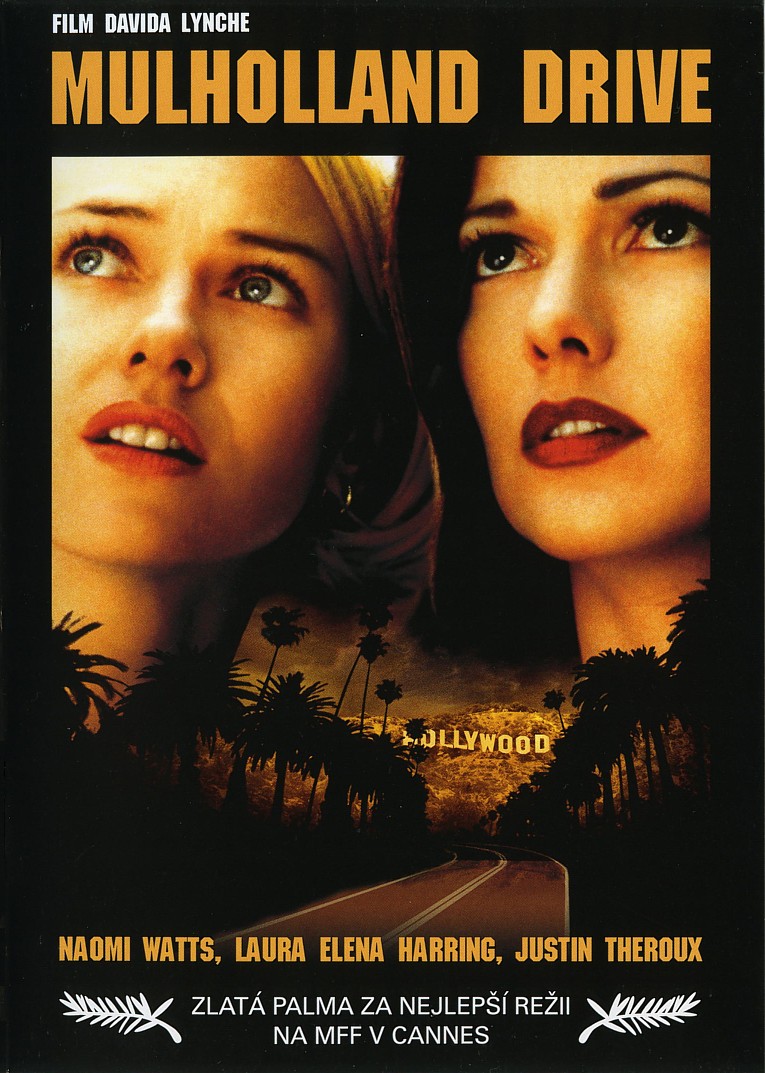Mulholland Drive
 Title: Mulholland Drive
Title: Mulholland DriveGenre: Mystery, Psychological Thriller
Rating: 4.5
Starring: Naomi Watts, Laura Elena Harring
This film is bizarre. It is safe to say that this is the logical outcome of "David Lynch's" career. The progression can be noticed from the beginning with "Eraserhead". I can't really say what the "plot" is; it's more of a dream, something surreal that "Lynch" got us used to in previous films. We have "Rita" (Harring); an amnesiac who wanders into the house of "Betty", an aspiring and a naive actress comes to "Hollywood" with dreams of stardom. Many of the film's elements are considered clichéd, like the naïve newcomer, the dark femme fatal, etc… but "Lynch" brilliantly takes us through a surreal and psychological journey, which really leaves our minds in bewilderment. But what is the plot? What does it mean? The only one that really knows is the writer, who happens to be also the director, and he left it open for us to interpret it in many different ways, like a dream.
The most fascinating thing about this film is the direction. To those aren't familiar with any of "Lynch's" previous works, this can get a bit frustrating. He didn't intend for this film to make a perfect sense, many directors have this ambiguity, but here it's just layers upon layers of dreams and inner desires that personify themselves in a way that makes us ponder. This is a film I am sure "Freud" would enjoy. Also, how he represented for us the characters is quiet convenient. We see "Rita" as the seductive and dark figure the incarnate the "Neo-Noir" style, a style we in films such as "Chinatown", we see "Betty" as the epitome of naivety, but in the audition scene she turns to such a sexual and sensual force that we become positive that there's something beneath what meets the eye. This is a trip to the unconscious, with the various effects "Lynch" used, like the disparity of light (how they reflects the character's moods), the focus on details that we might take for granted (something we can see Hitchcock's influence, especially from "Vertigo"), and the elegant way in switching between scenes among other things. Many things in this film I can't really describe, how can someone convey the full meaning of a dream? My last remark on the direction is how "Lynch" made a clever use of the soundtrack, composed by "Angelo Badalamenti" who already worked with "Lynch" on films such as "Blue Velvet". It's quiet dark, which suited the film's motives, and with a heavy use of synthesizers, we are able to drift away. This is a case similar to "Vertigo" and its soundtrack composed by "Bernard Herrmann".
The actors did a really good job. The transitions that were made, something I can't elaborate more on lest I spoil, showed us how sometimes the human mind works by rejecting reality and substituting it with its own. "Watts" stood out the most between the ensemble. This is her breakthrough role; she went to star in some good films. I consider this to be her second best; the best would be "21 Grams". "Harring" was brilliant in captivating the eye. She is the perfect actress for the "Neo-Noir" style. At first when we first meet them, we think we know all there is to know, or what we expect to know, but we are proven quiet wrong. The other actors suited their roles well, but these two stood out.
"Lynch" did a good job with this script. It allowed him to have a better control on the film, which as we got used to, suited his style. It was an offence to the basic guidelines of narrations, but this didn't lower its ranking as one of his best. I am sure "Lynch" is happy when we go deep in analysis, trying to discover the true meaning of the symbolism he uses. Why wouldn't he? He's that witty in doing this. Basically, there's no logical outcome of this film, as I pointed out. Everything can have more than one possible meaning, heck; some things appear to have no meaning at all! As clever this script is, I found dome tiny holes in it that didn't really make any sense. These things aren't related to the concept of the film, but some things that can let us wonder of their logic. I don't want to get into more details so I won't anyone.
To any one who's familiar with "Lynch's" work or of the surreal style in general this film is highly recommended. As I pointed, out, this can be quiet frustrating to those with no experience in this area. This film, without a doubt, is "David Lynch" in his best. Although my favorite film by him is the "Elephant Man", this film is superior. I don't think anyone with a critical eye will regret watching this film. This is a suiting film for those interested in psychology and the human unconscious.

Comments
Post a Comment